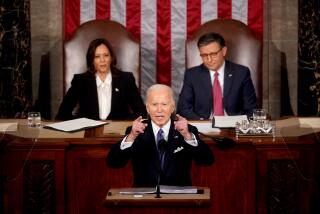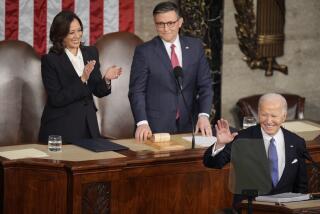A tale of two speeches
On Tuesday, President Obama will deliver his State of the Union address before a joint session of Congress. Shortly after his speech, a spokesman for the Republican Party will offer a televised rebuttal. And if the evening unfolds as usual, the speeches will be followed with contentious commentary by partisans on the left and the right, and forecasts of gridlock in the new Congress.
But perhaps this year the usual divisions will soften: The recent tragedy in Tucson has brought calls for civility and cooperation.
At many important moments of national challenge, a divided American electorate has devised ways to move forward. Fifty years ago, in January 1961, two historic addresses delivered within 70 hours of each other articulated the ways Americans, despite their differences, could unite around certain ideals.
On Jan. 17, President Dwight D. Eisenhower delivered a historic farewell address, followed on Jan. 20 by President John F. Kennedy’s storied inaugural address. These two speeches, delivered by political opponents, offer obvious contrasts in style and political philosophy. But the addresses converged on key points, namely on questions of citizenship in the modern age and on the belief that the American system of self-government can rise to any challenge.
Both speeches continue to fascinate. Fifty years on, Eisenhower’s famous warnings still seem prophetic. He warned that the American democratic process could be undermined by the “unwarranted acquisition of influence … by a military-industrial complex” and that public policy could fall captive to domination by a scientific-technological elite. In 2011, the threat remains, but the military-industrial complex of which he candidly spoke is relatively smaller (in terms of GDP). And since 1961, the political branches, perhaps heeding his warnings, have retained control over the Pentagon and military policy.
Likewise, Kennedy’s vision of a “peaceful revolution of hope” continues to galvanize efforts to overcome poverty and encourage wise development at home and abroad, as do his memorable words about the social responsibilities inherent in a free and just society. “If a free society cannot help the many who are poor,” Kennedy declared, “it cannot save the few who are rich.”
These speeches were carefully drafted over a period of time. New documents released at the Eisenhower library, and well-known documents at the Kennedy library, indicate that both were the result of an extraordinary effort to find the exact words and phrases to articulate their respective points of view — in a unifying way — and to communicate their common theme of revitalizing the spirit of citizenship.
Eisenhower’s address was planned for more than 18 months. In 1959, the president mentioned to his advisors his desire to make several speeches, including a farewell address, in which he would discuss “the need for common sense to accommodate the broad range of belief in the political spectrum of America, particularly in an era when the nation may have an executive of one party and Congress of another.”
That had been the case for the final six years of Eisenhower’s presidency, as it often has been in recent administrations. Kennedy’s address too took shape over several years, in his Senate speeches, in his campaign speeches and in several books. Neither speech shied away from controversy.
But what should be of prime interest today are the ways that the outgoing Republican president and the incoming Democratic president affirmed a common creed and a consistent view of citizenship, though offered from distinctive perspectives. Eisenhower’s focus was on the potential obstacles to “active” citizenship that had developed in his time; Kennedy’s, with it’s famous “ask not” line, on the possibilities and duties of citizenship. Yet both called on citizens — elected officials and private citizens alike — to contribute toward social betterment, to be informed and to participate in public affairs, and to set high standards in community and political life.
“Only an alert and knowledgeable citizenry,” Eisenhower said, “can compel the proper meshing of the … machinery of defense with our peaceful methods and goals, so that security and liberty can prosper together.”
“In your hands, my fellow citizens,” Kennedy echoed, “rests the final success or failure of our course.”
These speeches affirmed basic points of our civic creed: that Americans may disagree, but over means, not ends; that Americans, if threatened, will “pay any price, bear any burden … [and] meet any hardship,” as Kennedy put it, to defend America and American values; that Americans, as Eisenhower put it, must be worthy of a free and religious people whose basic purposes are “to foster progress in human achievement... to enhance liberty, dignity and integrity among people and among nations.”
Implicit in both speeches was a traditional American theme of optimism, of faith in a better future, which proved justified in the years to come as the United States prevailed in the Cold War, wrote new chapters in civil rights, and enjoyed ever higher levels of prosperity.
Can Americans restore a style in public affairs that Eisenhower in 1961 envisioned for the world? “Down the long lane of history,” he said toward the close of his farewell remarks, “America knows that this world of ours, ever growing smaller, must avoid becoming a community of dreadful fear and hate, and be, instead, a proud confederation of mutual trust and respect.”
The United States in January 2011 cannot afford to become a battlefield of ideology and mistrust. America’s problems and challenges require that Americans find common ground, at least on basics — the message of the Eisenhower and Kennedy speeches 50 years ago. Hasn’t the time come to stop emphasizing differences, to speak and act as citizens, to find the points of agreement, and to set America’s sights on the future? The president’s annual speech before the Congress offers Americans a brand new — and excellent — chance to start.
David Eisenhower is director of the Institute for Public Service at the Annenberg School for Communication at the University of Pennsylvania and the author of “Going Home to Glory: A Memoir of Life with Dwight D. Eisenhower, 1961-1969.”
More to Read
A cure for the common opinion
Get thought-provoking perspectives with our weekly newsletter.
You may occasionally receive promotional content from the Los Angeles Times.






